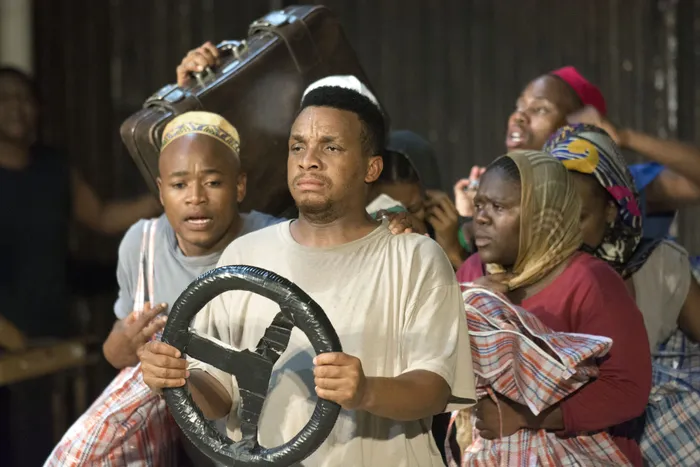
A MAN OF GOOD HOPE Adapted by Isango Ensemble. Directed by Mark Dornford-May. Music arranged and composed by Mandisi Dyantyis. Musical directors Pauline Malefane and Mandisi Dyantyis. Choreographer Lungelo Nqamlana, with Pauline Malefane, Noluthando Boqwana, Ayanda Eleki, Zamile Gantana, Zanele Mbatha, Katlego Mmusi, Zoleka Mpotsha, Busisiwe Ngejane, Sonwabo Ntshata, Luvo Rasemeni, Masakane Sotayisi, Luvo Tamba and Ayanda Tikolo. At Baxter Theatre until August 20. TRACEY SAUNDERS reviews
WHEN David Lan, the artistic director of the Young Vic Theatre in London decided to bring Jonny Steinberg’s book A Man of Good Hope to the stage after reading it in 2014 he could not have known how timely a story about migration in 2016 would be.
Steinberg’s book details the story of Asad Abdullahi, a young man from Somalia who made the treacherous journey undertaken by so many from that region to South Africa in search of a better future. With the migrant crisis facing Europe and the UK when the play transfers to the Young Vic in October it is sure to strike a chord.
It is a familiar story for South Africans as refugees from other parts of Africa flee conflict and persecution in the hope of finding peace. Sadly peace is not always what they find and the xenophobic violence which resulted in many lost lives, looted shops and internally displaced people in 2008 is dealt with unflinchingly in this dramatisation.
The Isango Ensemble’s distinctive and unique style of African opera enable this story to be told with a particular African sensibility.
There are some jarring moments when the marimba sound is used as a backdrop for all regions of Africa with only minor variations, but given the overall impact of the musical soundscape which is both a musical score and serves as sound effects ranging from bullets to forest animals, that is of small consequence.
The instruments are accompanied by a choir of voices that are heart stopping and the moments when the full company sing in perfect harmony are spine chilling. The power of the voices amplifies the humanity of the story and emphasises that this is a story first and foremost about people and the human capacity to overcome.
The role of Asad is played by three different actors – Zoleka Mpotsha as a young boy, Luvo Tamba as a young man and Ayanda Tikolo as he narrates the story and looks back on his life.
The most believable of the three is Tamba as he deftly navigates the borders from Somalia through Kenya and Zimbabwe to the ultimate destination of South Africa.
His youthful enthusiasm and sanguine outlook on life along with some very progressive views ensure that the audience is alongside him on every step of the journey, willing his success.
Asad’s earliest memory of his mother being shot in a door way by Hawiye militia in his village in Somalia haunts him throughout his life and influences many of his life decisions.
The spectre of death and the overwhelming losses that he and his family endure are a constant theme throughout the play.
The scale of the brutality that he endures is unbelievable until one takes a moment to remember that this is no fictional account but a true story and one that is increasingly familiar.
The pervasiveness of death is portrayed by an interesting sequence performed by Zebulon K Mmusi which gives a lurid and graphic sense of the insidious brutality, a daily companion of refugees.
The adaptation has remained true to the book which Steinberg wrote after spending the year between October 2010 and September 2011 interviewing Asad at his home in Blikkiesdorp.
The narrative is dense and has chosen to be thorough rather than render his life in an easy digestible 55-minute performance.
While the story centres on Asad the feminine influence in his life is not negated.
From his mother to the woman who takes pity on him and his wives, each woman is rendered as influential and valuable. Pauline Malefane is a co-founder of Isango Ensemble and has starred in both the film and stage versions of U-Carmen eKhayelitsha.
In the mirror roles of Yindy, the woman who rescues him in Somalia and Sadicya, the woman he marries in Soetwater in Cape Town, she carries a fierce and quiet resilience, emblematic of African women.
Given that there are more migrants than at any time in human history, Asad’s story is echoed on the pages of newspapers across the world. The Global Trends report released by the UNHCR earlier this year found that 65.3 million people, or one person in 113, were displaced from their homes by conflict and persecution during 2015.
The idea of more than 65 million people, a figure greater than the population of Canada, Australia and New Zealand combined, being forced to flee their homes and their lives is staggering and it is really only when we look at an individual story that we can begin to comprehend what that means.
Theatre is a medium which encourages empathy and it is no more evident than in this epic which transforms the word migrant to the face of a young boy clutching at his mother’s inert body.
It may not combat the stream of humanity being displaced but it will make you stop and think about who exactly each one of those 65,3 million people are.
l www.computicket.co.za